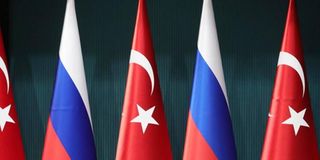Turkish-Russian Ankara talks on Syria and Libya yield no result

Forecasts and bravura statements by Turkish "experts" on the rapprochement between Moscow and Ankara as regards the settlement in the Syrian Idlib and Libya turned out wrong. The parties have not been able to mend fences that can form a sound basis for moving towards peace and political reforms.
Turkey flatly refused to reduce the number of its observation posts in the Idlib de-escalation zone (from 68 to 12 stipulated by the Astana agreements), as well as to partially withdraw heavy weapons (armored vehicles, artillery and air defense systems).
According to Turkish Foreign Minister Mevlüt Çavuşoğlu, "Turkey insists on a complete ceasefire in the provinces of Idlib, Hama, Aleppo and Latakia; consultations with Russia have come to be inefficient. With no tranquility in this area, the political process will end."
The next day after the Ankara talks ended, on September 18 morning, the Turks entered the province of Idlib with another column of military equipment, property and personnel.
According to Arab military observers, the total number of Turkish armed forces in northwestern Syria accounts for about 15 thousand soldiers.
Consultations on Libya ended to the same little effect. The Turkish side insisted to evacuate all the employees of a private Russian security company in charge of protecting oil fields and other infrastructural facilities for Libya's natural resources from around al-Jufra.
Moscow generally supported the Turkish initiative to create a demilitarized zone between Sirte and al-Jufra, provided, however, that Turkish troops and foreign mercenaries leave Libya.
The Turks did not even want to discuss the possibility of implementing this proposal, promising Russia "full economic cooperation with Libya."
It should be recalled once again that Turkey and its President Recep Tayyip Erdogan personally did not comply with any of the obligations assumed on Syria under the agreements reached in Astana, Sochi or Moscow.
The attempt to sell the bailed Russian S-400 air defense system looks like a real betrayal. Prospects for a full engagement of the Turkish Stream gas pipeline and Ankara's purchase of Russian fuel is unclear...
Once there was information that the Turkish leadership asked Russia to speed up the construction of a nuclear power plant, which is also carried against a multibillion-dollar loan.
All this and a host of other things quite naturally cause a cautious attitude with Moscow. Virtually, there is good reason for anxiety: you should not trust your Asian neighbor, whose leadership claims to restore an epoch-making empire. Russia does account for this, believing that it is better to maintain good-neighborly relations with Turkey than to be guided by some Cold War principles.
The Turks are in the cross hairs for the time being. Erdogan "spread his fingers wide" in an attempt to impose Turkish influence on half the world. Turkish military personnel are present in Qatar, Somalia, Libya, Syria, Iraq, and Azerbaijan. Ankara has complicated relations with Western Europe and the Arab world, as well as a conflict situation with Athens and Paris.
The only bargaining chip of the Turks is their control over hundreds of thousands of refugees in their country and Libya, whose extradition to Europe Ankara threatens the world community with. So far, the Turkish policy of undisguised blackmail of the Old World has produced a positive result and is catching up to the unredeemed promises to accept the Ottomans into their family.
As for the United States, it does not get actively engaged in the mentioned events, guided by the interest of weakening all the parties to the greatest possible extent – Turkey, Europe, the Arab world and all the others. Therefore, Washington seeks to remain "above the conflict" of interests, cutting to the chase of sanctions war with Russia and China.
Foreign observers loyal to Russia believe that the country will come off with flying colors from any challenging situation, provided its leadership shows its spirits and uses political and other compromises only after scrupulously contemplating multi-move combinations and without relying on hollow promises by its counterparts.
Thus, it was all for nothing that Ankara had preemptively announced "progress" in negotiations between Russia and Turkey. But this should be probably taken as a propaganda step familiar to the Ottomans, aimed at domestic consumption. No dice, however. The parties did not even make a protocol statement on their intention to proceed with mutual consultations..


